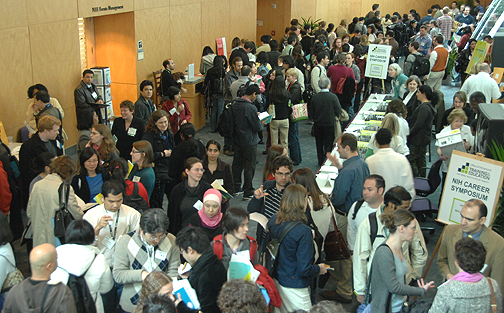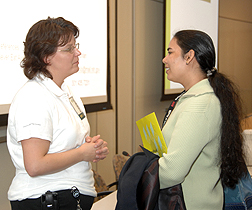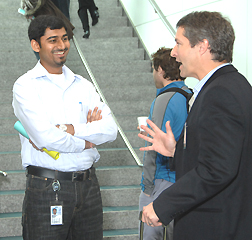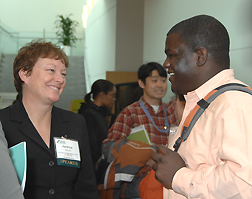
| T H E N I H C A T A L Y S T | M A Y – J U N E 2008 |
|
|
|
TRAINEES PACK NATCHER FOR CAREER SYMPOSIUM
|
by
Caroline Small |
 |
|
Some of the 800-plus attendees during a break from the symposium |
Animated speakers and an eager
crowd
of more than 800 NIH trainees
defined the first annual NIH Career Symposium, held April 9 at the Natcher
Conference Center.
Keynote speaker Peter Fiske, author
and CEO of of a California-based technology company, set the tone—serious
and playful—in describing the significance of having the letters “Ph.D.”
follow one’s name.
These letters, Fiske said, reflect
an educational process that has conferred on degree holders (the postdocs and
graduate students in the audience) an assortment of highly valued transferable
skills and character traits that are advantageous in any chosen career
field—and, he added, having a Ph.D. means that people think “you are a
lot smarter than we know you actually are.”
Throughout the day, Fiske and other
panelists echoed the sentiment that Ph.D. candidates often sell themselves
short. They urged trainees to value their skills and abilities and make them
shine in their true lights on CVs and any other job-seeking description of
oneself.
Another recurring theme was the need
to make oneself available to new options and be ready for opportunities when
they arise. “It is the prepared people that have all the lucky things happen to
them,” said Sharon Milgram, director of the Office of Intramural Training and
Education, encapsulating OITE’s goal for the event. Her office, which co-hosted
the symposium, encourages trainees to learn how best to prepare for a
scientific career, including how to gracefully transition from one to another
position, as well as to anticipate and achieve the skills necessary to move on
to one’s desired destination. OITE staff and private consultants were on hand
to discuss personal and career development.
More than 70 speakers from private consulting
firms, government agencies, educational institutions, and biotechnology
companies participated in 15 panel discussions.
The great strength of the event was
the range of speakers—in fields represented, degrees held, and positions
attained. Some were a few years into their career of choice; others had more
than 30 years of experience.
Each panel was followed by a social
period of information exchange and networking, and many panel participants were
eager to speak with trainees after the event.
Some of the most popular sessions
focused on how to get jobs in academia and industry—jobs that involve
heavy bench work. But bench research, Milgram observed, is not the only path to
advancing scientific excellence, education, and development in the modern world.
Beyond technical ability, she observed, scientists need to master the skills
needed to be team players, leaders, mentors, and professionals.
The larger-than-expected crowd, most
of whom stayed for most of the day, reflects the event’s success. Many speakers
expressed interest in participating again next year. Milgram declared the day
“a huge step forward” in providing solid and comprehensive career development
services.
 |
 |
 |
| Lori Conlan, director of the Office of Postdoctoral
Services, OITE (left) speaking at length with a postdoc
|
NCBI visiting fellow Manoj Tyagi (left) enjoying a post-talk encounter
with keynoter Peter Fiske |
Speaker Patricia Phelps, University of North Carolina
School of Medicine, Chapel Hill (left), touching base with Anthony Bount, a UNC-GPP student |